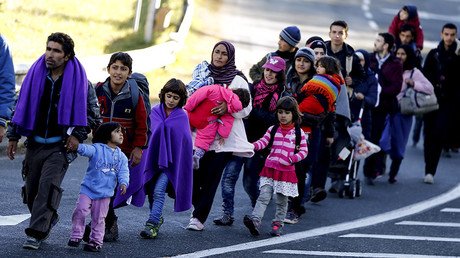EU launches legal cases against Hungary, Poland, Czech Republic for not taking in refugees
The European Commission has launched legal action against three EU member states, claiming Poland, Hungary, and Czech Republic have not “taken the necessary action” in dealing with migrants and refugees.
Infringement proceedings were launched by Brussels on Tuesday.
Warsaw, Budapest, and Prague have been accused of not fulfilling their obligations in dealing with migrants and refugees according to a 2015 plan.
The three EU states have acted “in breach of their legal obligations,” the commission said in a statement, adding that it had previously warned the countries to observe “their commitments to Greece, Italy and other member states.”
The Czech Republic, Hungary, and Poland “have not yet taken the necessary action,” the statement says, claiming that the three EU members “have not yet relocated a single person.”
“Against this background… the Commission has decided to launch infringement procedures against these three Member States.”
Since January, other countries within the bloc have relocated almost 10,300 people from Italy and Greece, according to the commission. “The pace of relocation has significantly increased,” it added, saying it has witnessed “a fivefold increase” compared to the same period last year.
In total, nearly 21,000 asylum-seekers have been distributed throughout Europe, some 14,000 from Greece and the rest from Italy.
READ MORE: German men claiming paternity of migrant children in exchange for cash, prosecutors say
Czech Prime Minister Bohuslav Sobotka slammed Brussels’ decision and called its plan to deal with migrants “dysfunctional,” Reuters reports.
“The European Commission blindly insists on pushing ahead with dysfunctional quotas which decreased citizens’ trust in EU abilities and pushed back working and conceptual solutions to the migration crisis,” the news agency cited Sobotka as saying in an email statement.
Warsaw has also reacted to Brussels’ decision, saying it intends to carry on with its current migration policy and does not intend to accept its quota of refugees. It is ready to defend its right to not take in refugees in an EU court, Polish Deputy Foreign Minister Konrad Szymanski told the Polish Press Agency (PAP) on Tuesday.
The initiation of infringement procedures would only further escalate EU divisions, and push the bloc further away from a “necessary political compromise” to solve the migrant crisis on the continent, the Polish official said.
He also called the 2015 plan “erroneous,” and argued that Warsaw contributes to solving the migrant crisis by “engaging in protection of EU’s external borders and systematically strengthening its humanitarian involvement in the region.”
However, in its Tuesday statement, the EU Commission cited its migration commissioner, Dimitris Avramopoulos, as saying, “When it comes to relocation, let me be crystal clear: the implementation of the Council Decisions on relocation is a legal obligation, not a choice.”
“Relocation works if there is political will,” Brussels claimed.
In September 2015, EU ministers took up a plan to relocate over 100,000 migrants who have already reached the continent, throughout Europe. However, not all EU states have found the measures acceptable, saying that the migrant crisis cannot be solved through obligatory quotas.
The Czech Republic, Romania, Slovakia and Hungary have been staunchly opposing the plan. Despite warnings from Brussels, Budapest is determined to tighten its policy towards asylum seekers and carry on with its own border fence plan.















